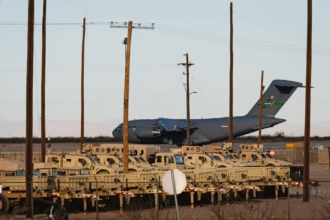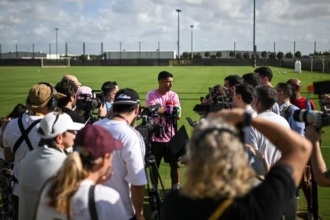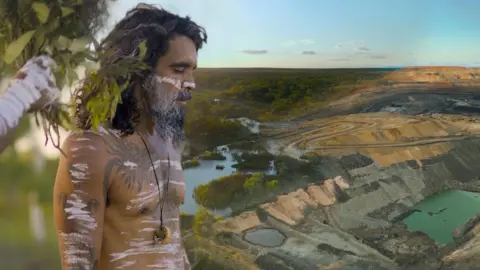 BBC
BBCA small ceremonial fire has been burning for more than 1,300 days on a dusty stretch of Wangan and Jagalingou Country in central Queensland, the second largest state in Australia.
The flame marks the site of a protest that has been going on for more than four years. It stands at the heart of a long-running standoff between part of the local Indigenous community and the Carmichael coal mine, one of the country’s most controversial mining projects.
The mine, owned by Indian energy giant Adani which operates locally as Bravus, sits just across the road. It is located on the traditional land of the Wangan and Jagalingou (W&J) people.
Adrian Burragubba and his son Coedie McAvoy have been waging a long campaign against Bravus, taking, as they see it, a spiritual stand as well as fighting for cultural survival.
“Where my land is, there’s a mine trying to destroy my country,” Adrian says. “That country is the roadmap to my history and knowledge about who I am and my ancestors.”
At the heart of their resistance is Doongmabulla Springs, a sacred site which they believe was created by the rainbow serpent Mundagudda – a powerful ancestral being in many ancient Aboriginal creation stories, often associated with water, creation and the land.
Hydrocarbon traces
The Doongmabulla Springs are connected to a bigger underground water system that helps keep the dry land alive. It sits above the Galilee Basin, one of the largest untapped coal reserves in the world, a 247,000-sq-km region containing more than 30 billion tonnes of coal.
Some scientists – which include Prof Matthew Currell, one of Australia’s leading hydrogeologists, from Griffith University in Melbourne – say the site is ecologically significant and potentially vulnerable.
“We started noticing a couple of things, from time to time actually seeing hydrocarbons being detected within the spring waters themselves,” says the academic, who has studied the area for several years.
“If hydrocarbons have only started turning up after mining, then we have to explain why. If it’s linked to mining activity, then it’s a red flag that the spring water quality is imminently under threat,” he says.
“We’re seeing signs that the impact from the mine is greater than what had been predicted when it was approved. I think that needs to prompt a full re-evaluation of that approval.”
A growing body of evidence suggests that mining activity could be having more impact on groundwater than originally forecast.
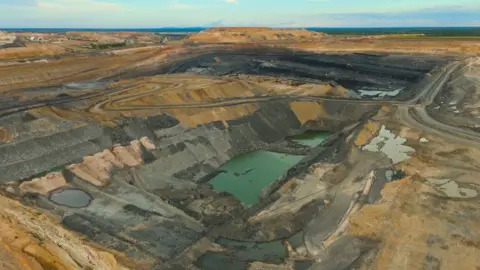
Prof Currell’s findings, co-authored with Dr Angus Campbell and peer-reviewed in 2024, have raised concerns about Adani/Bravus’s groundwater modelling.
The company rejected the findings and accused some of the article’s authors of being anti-coal campaigners, which they deny.
Australia’s national science agency, CSIRO, also reviewed Adani’s analysis of the impact of the Carmichael mine on groundwater in the area in 2023. That review, which is part of the evidence being examined in an ongoing court case, concluded that Adani’s models were not “fit for the purpose” of assessing the impact of the mine on the springs.
In 2023, following a review of Adani/Bravus’s groundwater monitoring data, the government banned their planned underground mining due to uncertainty over the impact it would have on the springs.
Adani is challenging this ban in court. The company insists it has complied with environmental and legal standards.
“There have been no breaches of our groundwater conditions and the Doongmabulla Springs complex is not at risk from any of the mining we are doing now or are authorised to do in the future,” it said in a statement to the BBC.
Queensland’s Environment Minister, Andrew Powell, told the BBC: “We are committed to protecting the cultural and environmental values of the springs by taking appropriate enforcement action.”
A divided community
The government’s decision to approve the Carmichael mine has polarised Australia for nearly a decade.
Adrian Burragubba and his family argue that the mine is threatening their sacred water source, and that their rights, culture and connection to “country”, as Indigenous Australians term their ancestral homeland, are being ignored.
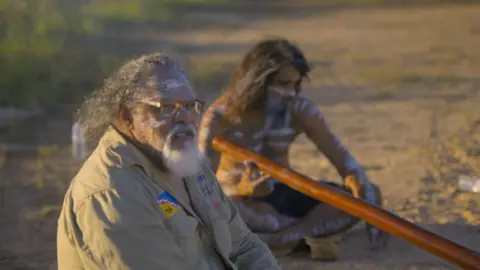
The UN Declaration on the Rights of Indigenous Peoples, adopted in 2007, requires “states to obtain free, prior and informed consent before undertaking projects that affect rights to land, including mining”. While not legally binding, the declaration serves as a framework for harmonising relations between states and Indigenous peoples.
The controversy surrounding the mine has also long been a flashpoint in the climate debate, attracting both protests across the nation and strong support from local mining communities. The Queensland government had approved the project, citing its potential to generate jobs and boost exports.
Australia is already one of the world’s top coal producers. The Carmichael mine exports to the Asia-Pacific region, where demand for coal is projected to stay high, even as economies aim to use more renewable energy.
Bravus says it has invested more than $486m in the town where many of the mine’s workers reside. But allegations of poor working conditions have surfaced.
Journalist Kim Nguyen, who has spent years covering stories on the Carmichael mine, has spoken to workers who say they have been exposed to unsafe dust levels, made to work in substandard infrastructure and faced a culture of fear when raising concerns.
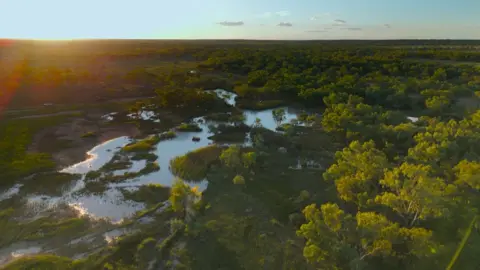
Queensland’s mining safety regulator confirmed there were 875 pages worth of serious accident reports from 2019 to 2024, but said the mine’s incident rate was “broadly consistent with industry averages”.
Bravus responded: “We have a zero-fatality record (…) We maintain high standards, comply with all legislation, encourage people to raise concerns anonymously or in person and these are resolved as they arise.”
After the state government declared it would approve the mine without Indigenous consent, seven out of twelve W&J family groups signed a land agreement with Adani in exchange for a community fund.
“It’s split families,” says W&J woman Jackie Broderick. “I feel terrible about the destruction of the land, but if we hadn’t agreed [to the mine project], they would have just gone ahead anyway. We got out of it what we could,” she says.
Others believe the deal came at too high a cost. “Mining is God in this country. One mine has divided a whole nation,” says Coedie.
In a statement, Bravus said: “Adrian Burragubba and his allies in the anti-fossil fuel movement have tried for many years to discredit our company and stop our Carmichael mine, which has been operating safely and responsibly in line with Queensland and Australian law.”
Land rights claim
In 1915, Queensland’s Aboriginal Protection Act allowed the forced removal of Aboriginal people from their land. Many W&J people were sent more than 1,000km away. Families were separated and practising Aboriginal culture was banned.
In 1993, the Native Title Act gave Aboriginal people limited land rights if they could prove continuous connection with it, including the right to negotiate on mining projects.
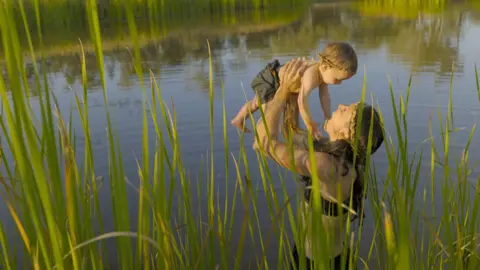
The W&J people lodged a Native Title claim in 2004. With that, they had the right to negotiate with Adani, which offered benefits in exchange for signing an agreement. However, in 2012 and again in 2014, no agreement could be reached, so Adani sought approval through the Native Title Tribunal without Indigenous consent.
In 2021, after 17 years, a judge dismissed the W&J Native Title claim, removing their right to consultation or compensation for future mines under the law. This was because they failed to establish a sufficient connection to the land.
“A judge ultimately made a determination that the native title did not exist in the claim area, and it’s now subject to application to the High Court of Australia for special leave to appeal,” says Tim Wishart, head of the Queensland South Native Title Service.
“I don’t think it’s a particularly fair system, but it’s all we’ve got at the moment,” he adds.
Legal fight continues
Adrian is now pursuing a judicial review in Queensland’s Supreme Court, arguing that the mine violates his community’s human rights by threatening a sacred site.
Their argument is based on Section 28 of the state’s Human Rights Act, which protects the right of Indigenous people to practise their culture and maintain their connection to land and water.
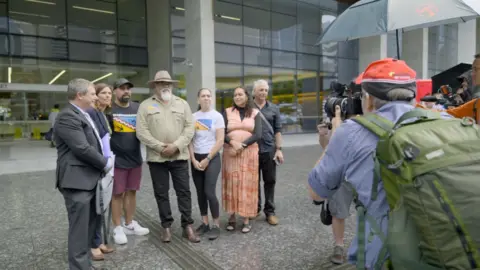
It is a case that could set a precedent, says Alison Rose, Adrian and Coedie’s lawyer.
“It will be a really important test case that will be followed by other First Nations [Indigenous] people who are wanting to protect culture and country,” she says.
This is Adrian’s fourth case against the government, using pro bono lawyers. Previously, he became bankrupt after fighting one court case and being hit with $680,000 in costs.
But despite the bankruptcy, the court losses and internal community rifts, Adrian, his son Coedie and their family remain undeterred.
“We come from the water,” Adrian says. “Without the water, we’re all dead. Without land, we’ve got nothing.”
The Queensland government has requested the court strike out Adrian’s human rights case. The verdict has yet to come.
Text adapted by Selin Girit and edited by Alexandra Fouché







